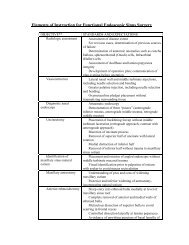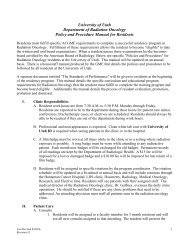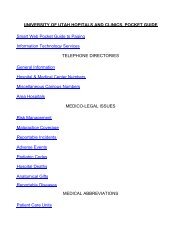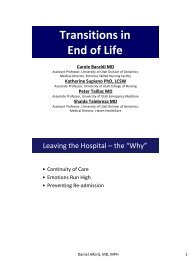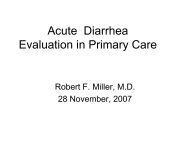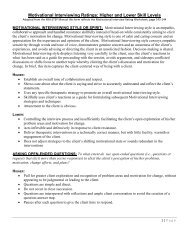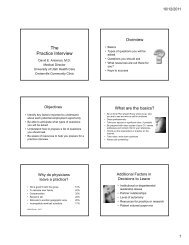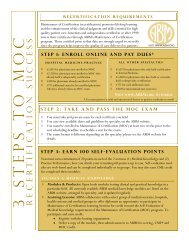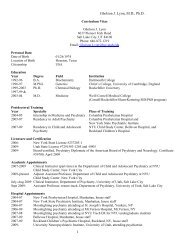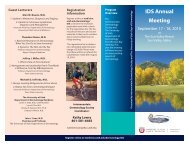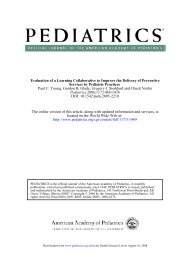Pre-Operative Cardiopulmonary Assessment: 2013 - University of ...
Pre-Operative Cardiopulmonary Assessment: 2013 - University of ...
Pre-Operative Cardiopulmonary Assessment: 2013 - University of ...
You also want an ePaper? Increase the reach of your titles
YUMPU automatically turns print PDFs into web optimized ePapers that Google loves.
<strong>Pre</strong>-<strong>Operative</strong><br />
<strong>Cardiopulmonary</strong> <strong>Assessment</strong>:<br />
<strong>2013</strong><br />
Russell Vinik, M.D.<br />
Associate Pr<strong>of</strong>essor <strong>of</strong> Medicine<br />
<strong>University</strong> <strong>of</strong> Utah School <strong>of</strong> Medicine
Case<br />
!! 71 year old man presents for pre-operative<br />
evaluation for Hip Arthroplasty.<br />
!! He is severely limited by his symptoms and wants to<br />
get the hip fixed ASAP<br />
!! PMH: DM, Htn, CKD (creatinine 1.5)<br />
!! No previous MI<br />
!! Meds: glargine, metformin, lisinopril<br />
!! Never had a stress test.<br />
!! Echo 2 years ago was “normal”<br />
!! Ambulation is limited by pain in his hip.
Questions<br />
1.! What is this patients risk <strong>of</strong> having a<br />
peri-operative cardiac event?<br />
!! Will additional tests help to predict his risk?<br />
2.! Should we order a stress test?<br />
!! If positive, should we revascularize?<br />
3.! Other than revascularization, what other<br />
strategies might reduce his risk?<br />
!! Beta-blockers, Statins
Clinical Risk Stratification
Risk Factors: Revised Cardiac Risk<br />
Index (Lee Index)<br />
!! Developed in 4,315 patients age 50 or over<br />
!! Subsequently validated in cohort <strong>of</strong> 108, 593 patients<br />
!! 6 Risk factors<br />
!! High-risk Surgery*<br />
!! Ischemic Heart Disease<br />
!! History <strong>of</strong> CHF<br />
!! History <strong>of</strong> Cerebrovascular disease<br />
!! Insulin therapy for Diabetes<br />
!! <strong>Pre</strong>operative Creatinine >2.0 mg/dl<br />
!! 0 Factor Event rate= .4%<br />
!! 1 Factors = .9%<br />
!! 2 Factors = 7%<br />
!! 3 or more = 11%<br />
*High risk=intraperitoneal, intrathoracic, suprainguinal vascular<br />
Circulation. 1999;100:1043-1049 Am J Med2005;118:1134-41
ACC/AHA Perioperative Guidelines<br />
Active Cardiac Conditions
Clinical risk factors: CAD, CHF, DM, CVA/TIA, renal insufficiency<br />
ACC/AHA<br />
Algorithm<br />
Circulation 2007;116:e418-e499
- Used fictitious data<br />
- Submitted knowingly unreliable data<br />
- Inconsistency between source documents and case report forms<br />
- Source documentation missing<br />
- Adverse Events Committee did not exist<br />
JACC- “ We have elected not to retract these manuscripts. However, given<br />
the uncertainty regarding the accuracy <strong>of</strong> the data, readers should be<br />
cautioned in the application <strong>of</strong> the findings <strong>of</strong> these manuscripts to<br />
clinical practice.”<br />
J Am Coll Cardiol. 2012;60(25):2696-2697. Forbes Pharma & Healthcare 11/17/2011
Poldermans Articles<br />
!! Decrease- Bisoprolol reduced cardiac death/MI 3.4% vs. 34%<br />
NEJM 1999<br />
!! Decrease II- No benefit for cardiac testing in intermediate risk<br />
patients undergoing vascular surgery if beta blockers are given JACC<br />
06<br />
!! Decrease III – 497 patients- Fluvastatin reduced cardiac death/MI<br />
by 50% in vascular surgery patients NEJM 09<br />
!! Decrease IV- 1066 patient 2x2 study- bisoprolol assoc with 30 day<br />
reduction in cardiac death MI with trend for reduction with<br />
fluvastatin Ann Surg 09<br />
!! Decrease V- No benefit for prophylactic revascularization in<br />
patients with extensive ischemia if given B blockers JACC 07<br />
!! ESC Guidelines- Beta blockers and statins in high risk surgery<br />
(Class I) EurheartJ 09
Lets Start Over<br />
Can we better predict our<br />
patients risk <strong>of</strong> cardiac events
<strong>Pre</strong>-Op BNP helps to predict<br />
Cardiac Events in Vascular Surgery<br />
BNP Major Cardiac Event (%) OR<br />
372 36.7% 45<br />
•!Patients were re-classified using the Revised Cardiac Risk index<br />
•!NP < 116 moved down 1 risk group<br />
•!NP >116 moved up 1 risk group<br />
RCRI Risk MACE Total<br />
Low Risk (0) 5.9% 320<br />
Int Risk (1-2) 9.5% 476<br />
High Risk (3+) 20% 54<br />
Re-Classified MACE Total<br />
Low 3.7% 596<br />
Int 15.1% 93<br />
High 24% 161<br />
J Am Coll Cardiol 2011;58:522-9
Non Invasive Testing:<br />
Dypyridamole-thallium<br />
J Am Coll Cardiol 1996;27:787-98
Non Invasive Testing: Stress Echo<br />
!! Meta analysis <strong>of</strong> 68 studies with 10,049<br />
patients showed better negative predictive<br />
ability for stress echo compared to thallium<br />
imaging<br />
J Am Coll Cardiol 1996;27:787-9 Anesth Analg 2006;102:8-6
Management Strategies for High<br />
Risk Patients
<strong>Pre</strong>-Op Revascularization<br />
!! Reviewed 1600 patients in CASS registry who<br />
underwent non-cardiac operations<br />
!! Group 1 – no angiographic evidence <strong>of</strong> CAD<br />
!! Group 2 – CAD but prior CABG<br />
!! Group 3 – significant angiographic CAD (70%<br />
stenosis) but no prior bypass surgery.<br />
!! <strong>Operative</strong> mortality rates:<br />
!! Group 1 -No CAD= 0.5%<br />
!! Group 2- Prior CABG= 0.9%<br />
!! Group 3 = CAD without CABG=2.4%<br />
Ann Thorac Surg 1986; 41:42-50
CARP Trial<br />
!! Prospective Randomized trial<br />
!! Indication was AAA or arterial occlusive<br />
disease <strong>of</strong> the legs<br />
!! 510 patients randomized to revascularization<br />
vs no-revascularization<br />
!! All patients had at least 70% stenosis on cath<br />
!! Excluded Left Main dz, Severe AS, EF
CARP Trial Results<br />
!! Median Time from Randomization to surgery - 54 days in<br />
revascularization group vs. 18 days no revascularization<br />
!! Post-Op MI occurred in 12% in revascularization group<br />
vs. 14% (p=.37)<br />
!! Mortality at 2.7 years was 23% in the revascularization<br />
group vs. 22% (p=.92)<br />
!! Subsequent analysis:<br />
!! Nonfatal MI occurred in 16.8% <strong>of</strong> patients who had PCI vs.<br />
6.6% (p=.024) in CABG patients<br />
!! Differences in mortality remained insignificant 3.8% vs. 2.2%<br />
(p=.497)<br />
NEJM 2004; 351:2794-804 Ann Thorac Surg. 2006;82:795-800
<strong>Pre</strong>-Op Revascularization: PCI<br />
!! 40 patients undergoing non-cardiac surgery within 6-weeks <strong>of</strong> stent placement<br />
!! 20% mortality, 18% risk non-fatal MI, 28% major bleeding risk<br />
!! 216 patients who underwent surgery within 3 months <strong>of</strong> cardiac intervention<br />
!! 13 <strong>of</strong> 94 (14%) <strong>of</strong> patients who had been treated with stent died<br />
!! 13 <strong>of</strong> 122 (11%) <strong>of</strong> patients who had PTCA without stent died<br />
!! 899 patients who underwent non-cardiac procedure after bare metal stent- rate<br />
<strong>of</strong> major cardiac events:<br />
!! 10.5% if procedure
Anti-Platelet Therapy<br />
Fleisher, L. A. et al. Circulation 2007;116:e418-e499
Beta Blockers<br />
The controversy got even bigger
Perioperative !-blockers: Atenolol<br />
!! Randomized 200 patients undergoing non-cardiac<br />
surgery to Atenolol vs. Placebo<br />
!! Patients had either CAD or 2 or more risk factors*<br />
!! Absolute mortality:<br />
!! 0% vs 8%, (p < 0.001) at 6 months<br />
!! 10% vs. 21%, (p = 0.019) at 2 years<br />
!! Excluded in-hospital deaths<br />
!! Mortality reduction became insignificant after inclusion <strong>of</strong> inhospital<br />
deaths<br />
!! 8% <strong>of</strong> control group was previously on beta blockers<br />
and these were stopped possibly precipitating<br />
withdrawal during the peri-operative period<br />
*Risk factors: Age>65, Diabetes, Htn,<br />
Smoking, Total Cholesterol >240mg/dl NEJM 1996;335:17 17-20.
Placebo-Controlled Metoprolol<br />
Trials<br />
!! DIPOM- 921 Diabetics undergoing major surgery<br />
!! No benefit for metoprolol after 18 months<br />
!! initiated within 24 hours before surgery<br />
!! MAVS- 496 Patients undergoing vascular surgery<br />
!! No difference in 30 day events<br />
!! initiated within 2 hours <strong>of</strong> surgery<br />
!! POBBLE- 103 patients with previous MI having<br />
vascular surgery<br />
!! No difference in 30 day events<br />
!! initiated the day before surgery<br />
BMJ. 2006 Jun 24;332(7556):1482<br />
Am Heart J 2006 November;152:983-90, J Vasc Surg 2005;41:602-9
POISE Trial<br />
!! Double Blind- Randomized trial <strong>of</strong> 8351 patients<br />
!! Included:<br />
!! High risk group: Over 80% <strong>of</strong> patients had either a history <strong>of</strong> CAD,<br />
Peripheral Vascular Disease, or Stroke<br />
!! Excluded patients already on a beta blocker<br />
!! Procedure: patients given either extended release<br />
metoprolol or placebo<br />
!! 100mg pre-op<br />
!! 100mg 6 hour post op<br />
!! 200mg 12 hrs later and then 200mg daily for 30 days<br />
!! Patients unable to take po were given metoprolol 15mg IV every 6 hours<br />
!! Drug held if BP below 100mg Hg or HR
POISE Results<br />
Outcome Metoprolol<br />
n=4174<br />
Placebo<br />
n=4177<br />
Nonfatal MI 152 (3.6) 215 (5.1) .04<br />
A-fib 91 (2.2) 120 (2.9) .04<br />
Significant Hypotension 626 (15.0) 404 (9.7)
Author<br />
(Year)<br />
Statins in the Peri-operative Setting:<br />
Meta Analysis Results<br />
Population Included Findings<br />
Tabata (2009) Cardiovascular Surgery Mortality Benefit:<br />
OR 0.67 (0.54-0.83)<br />
Winchester<br />
(2010)<br />
Non cardiac surgery &<br />
PCI<br />
MI Reduction:<br />
RR 0.57 (0.46-0.7)<br />
All Cause Mortality:<br />
RR 0.66 (0.37-1.17)<br />
Tabata M et al. J Thorac Cardiovasc Surg 2008; 136:1510 & Winchester DE. J Am Coll Cardiol 2010; 56:000
Statins: A word <strong>of</strong> Caution<br />
!! Several studies <strong>of</strong> patients with Acute Coronary Syndromes have<br />
shown:<br />
!! 2-3 fold increase in cardiac events in patients in whom statin was<br />
acutely withdrawn during the hospitalization<br />
!! These patients had a higher cardiac event rate than those who were<br />
never started on a statin<br />
!! There are no intravenous formulations <strong>of</strong> statins<br />
!! What happens when the patient is NPO after surgery?<br />
!! Retrospective cohort <strong>of</strong> 298 statin users undergoing major vascular<br />
surgery:<br />
!! Post-Op statin discontinuation associated with:<br />
!! Hazard ratio 7.5 for cardiovascular death or MI<br />
!! 50-75% fewer events in patients taking extended release fluvastatin<br />
compared to other statins<br />
!! 200 consecutive patients after CABG- Post-op a-fib developed:<br />
!! 18% <strong>of</strong> patients who were re-initiated on statin within 48 hours after<br />
surgery vs. 28% <strong>of</strong> patients who were not.<br />
Arch Intern Med 2004;164:2162-8 Circ 2002;105:1446-52 Am J Cardiol 2007;100:316-20<br />
Am J Cardiol 2011;108:220-222
Conclusions<br />
! Risk stratification has good negative predictive<br />
value<br />
!! PCI as a bridge to surgery likely does more<br />
harm than good<br />
!! Consider stress testing if you would consider<br />
CABG prior to elective surgery<br />
!! Statins- likely good but keep them going<br />
!! Beta blockers<br />
!! Don’t stop them if the patient is already taking<br />
!! Should you start them?????<br />
!! If you do, start gently and give time to titrate.
Thank You.



